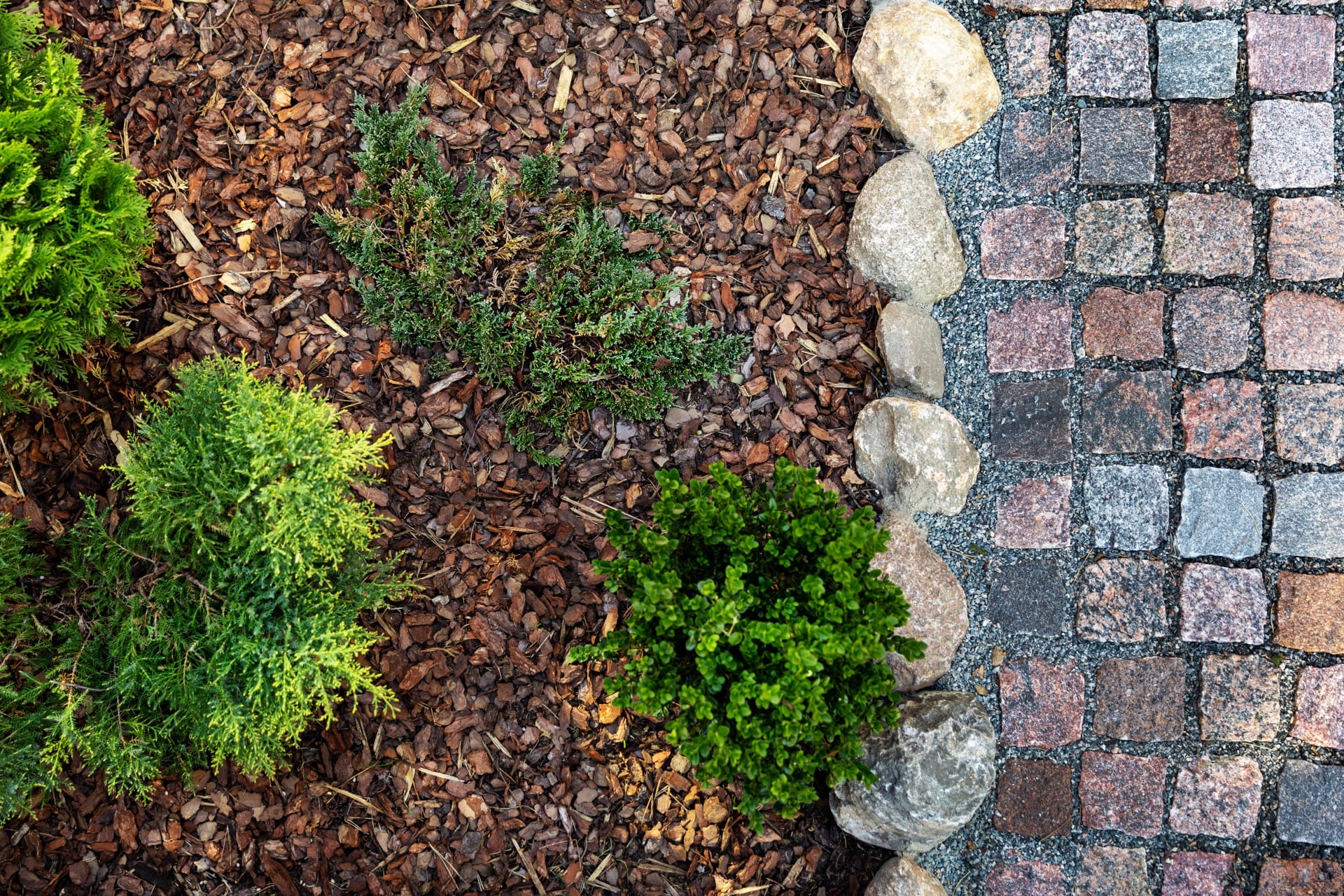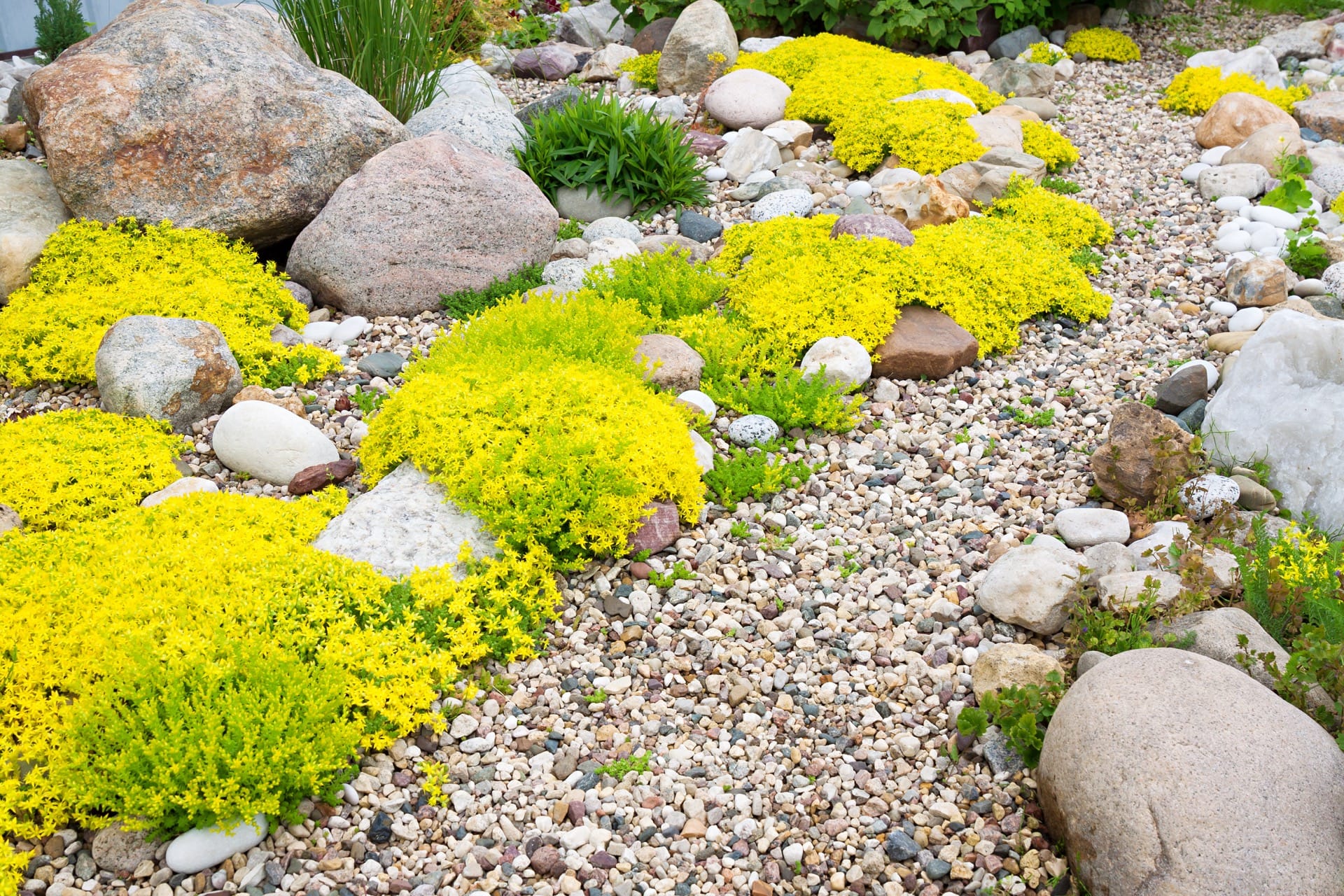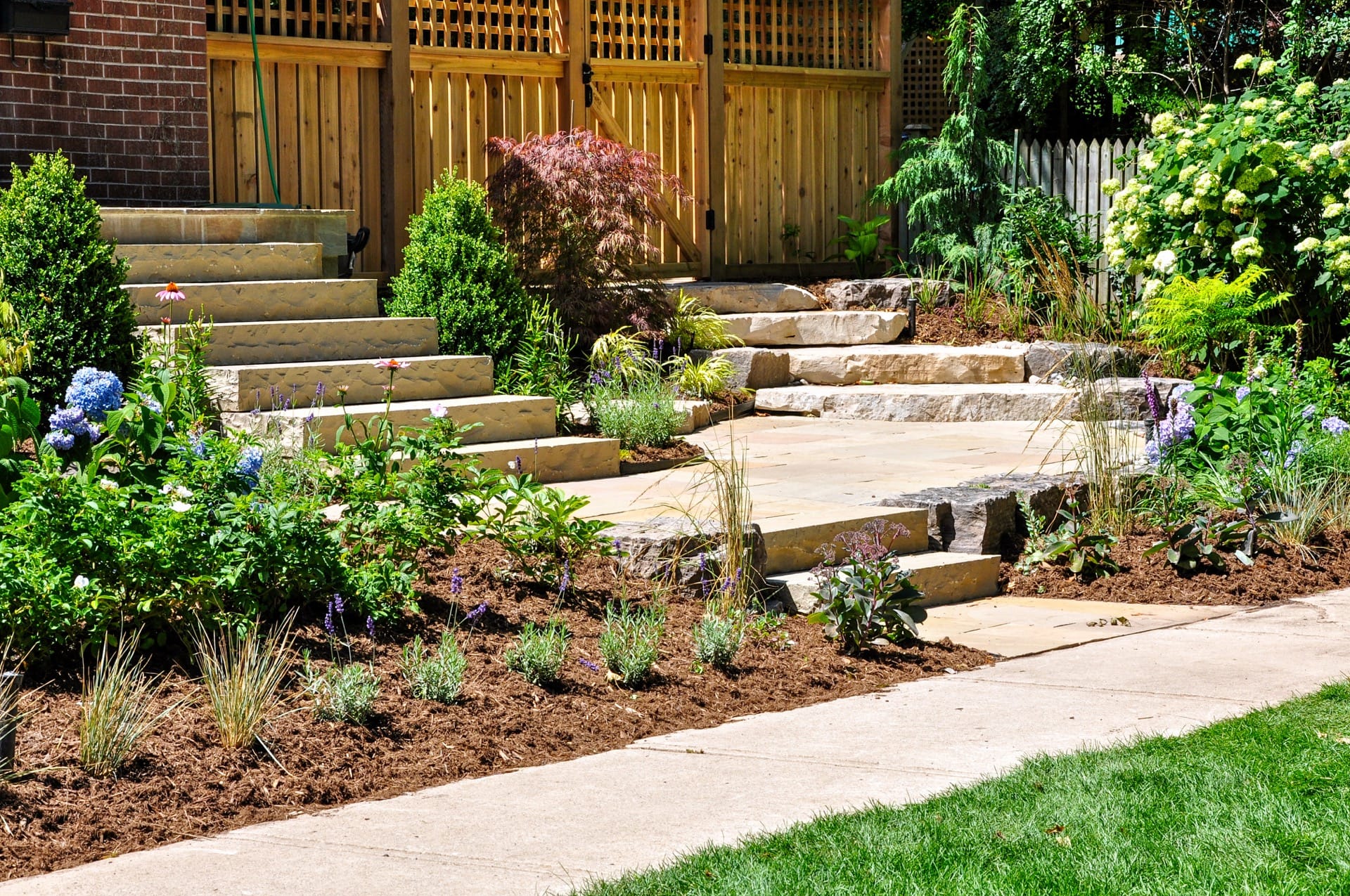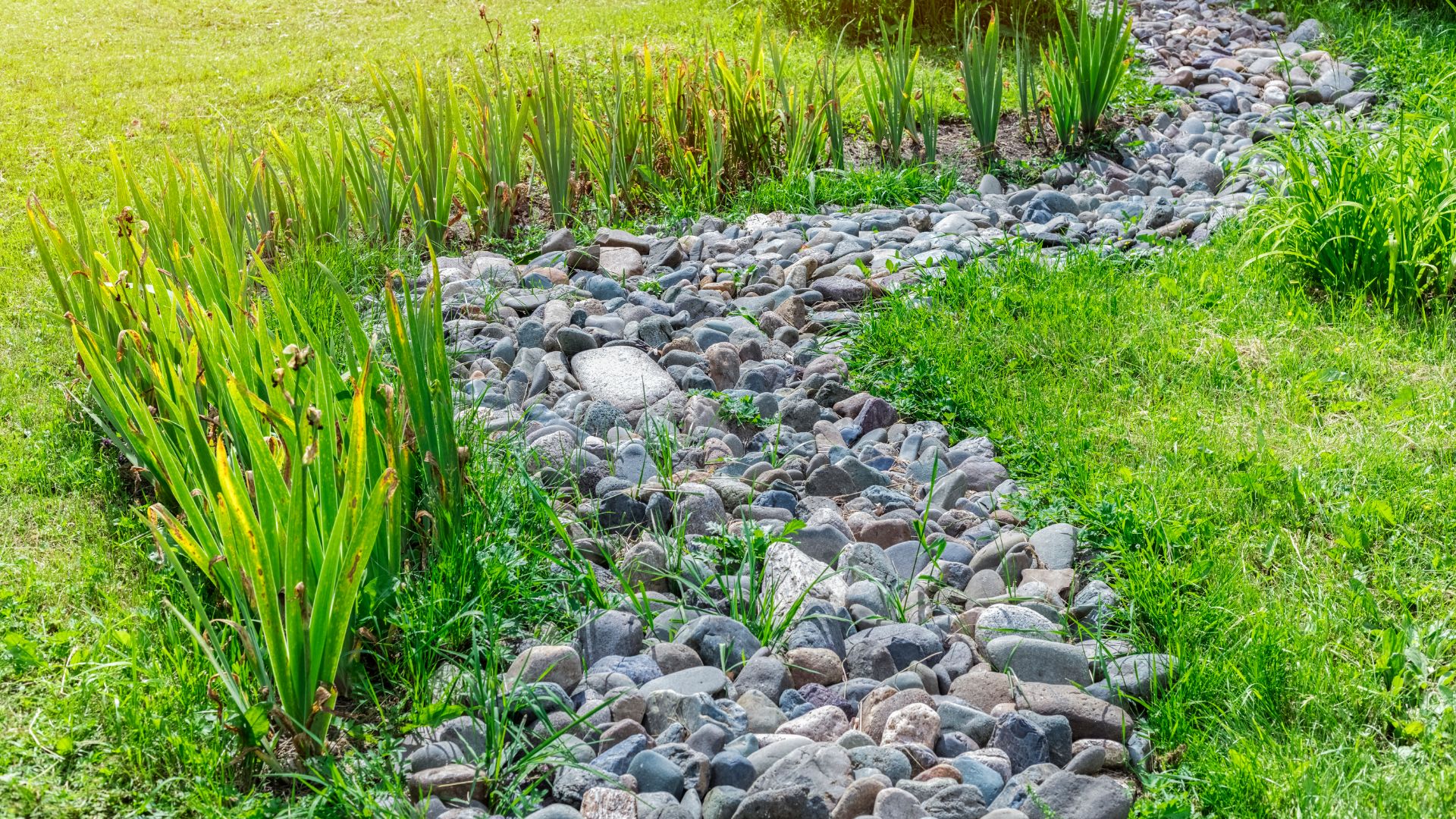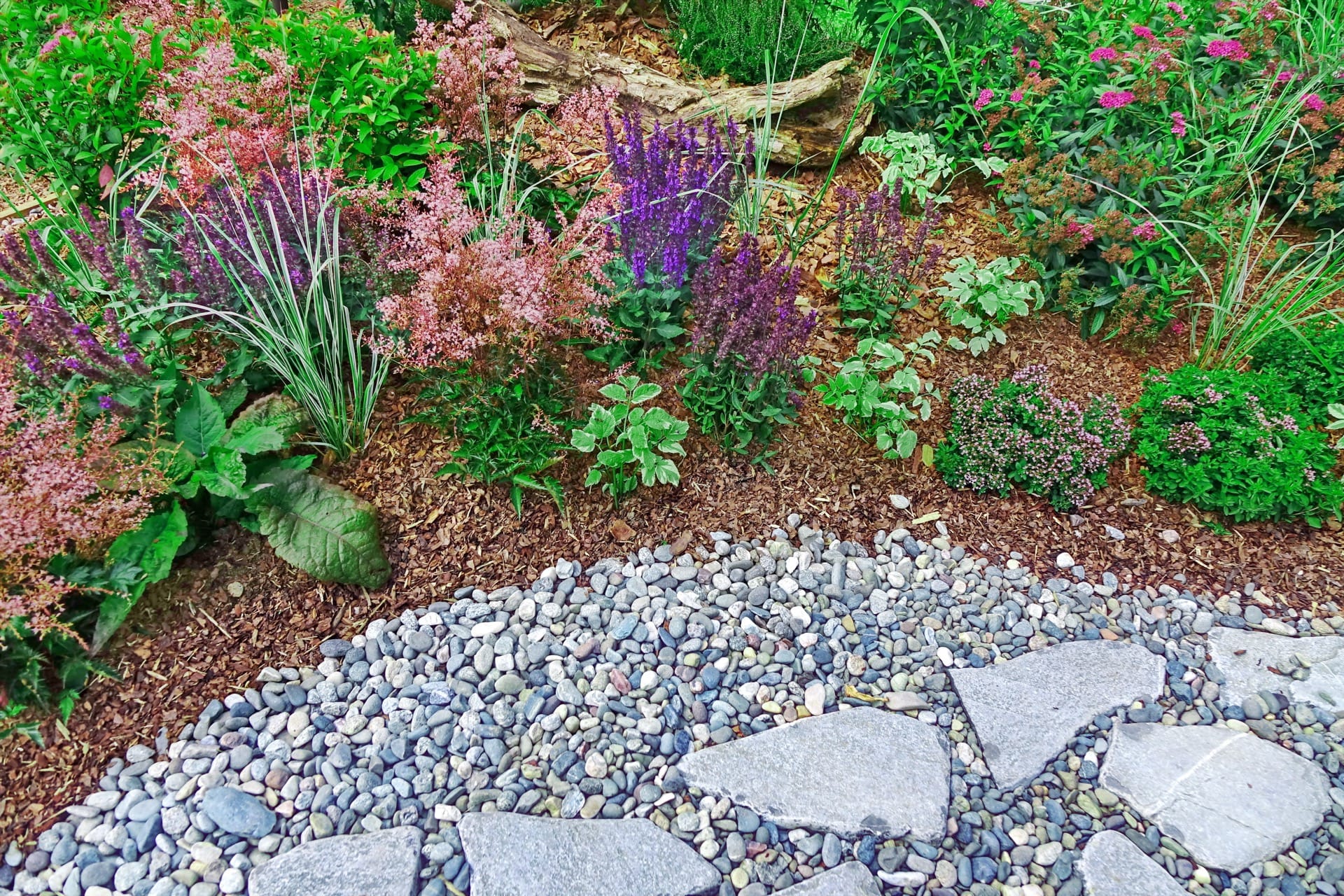
Ground Cover Showdown – Mulch vs Rock
Choosing the right ground cover is crucial for effective landscaping, impacting both the look and function of outdoor spaces. The decision often comes down to mulch or rock, each serving different needs.
Mulch is ideal for promoting plant growth and retaining moisture in garden beds. It helps keep the soil moist, essential for healthy plants, and adds nutrients as it breaks down, which supports a flourishing garden.
Rock, in contrast, suits areas that require low maintenance and strong weed control. Useful especially in landscape beds, rocks reduce the need for frequent upkeep and effectively prevent weeds, simplifying landscape management.
Understanding these applications helps homeowners choose the right material based on their landscape’s needs and maintenance preferences.
Best Applications of Rock and Mulch in Your Landscaping Design
Choosing the right ground cover for your landscaping is key to enhancing both the aesthetics and functionality of your outdoor spaces. Mulch is particularly effective in residential flower beds and around trees where the health of the soil and moisture retention are vital for plant survival and thriving gardens. On the other hand, rock is ideal for landscape beds in arid areas, settings like commercial properties where low maintenance is a priority, and even a great idea for stabilizing a sloped backyard.
Rock
Simplifies Upkeep: Reduces the need for regular maintenance, ideal for large areas such as commercial landscapes.
Effective Weed Suppression: Natural barrier against weeds, reducing the need for frequent weeding or chemical herbicides.
Adapts to Dry Conditions: Maintains appearance without the need for replacement or upkeep, even in less hospitable climates.
Heat Tolerance: Rocks retain heat, which can be beneficial in colder regions by maintaining a higher soil temperature around hardy plants. You can even leverage river rocks for house foundations, or an addition to the aesthetic vision you’re manifesting.
Mulch
Promotes Healthier Soil: Best for places where soil quality affects plant health, making it great for planting beds and tree surrounds.
Enhances Moisture Conservation: Helps the ground retain moisture, which is essential during hot or dry periods.
Nutrient Addition: As it decomposes, mulch provides more nutrients to the soil, enriching it and promoting lush plant growth.
Pros and Cons of Rock
When designing a landscape, choosing the right ground cover can dramatically influence the garden’s maintenance needs, appearance, and health. Rocks offer a distinctive set of advantages and challenges that can meet various landscaping goals, including a great idea for retaining wall integration with your garden. depending on factors such as climate, soil type, and the desired aesthetic. Whether opting for rock mulch or larger stones, hardscaping rocks into your landscape can be a practical decision, especially in regions where wind resistance and low maintenance are valued. Rocks are also advantageous in dry and hot areas because they’re fireproof and a great idea for fire-resistant landscaping.
Benefits of Using Rocks in Landscaping:
- Low Maintenance: Rocks are a durable, wind resistant choice that requires little upkeep, making them ideal for both residential and commercial properties.
- Weed Control: A fabric weed barrier under rocks effectively suppresses weed growth, leading to fewer weeds and cleaner garden lines.
- Environmental Advantages: Rocks are excellent for preventing soil erosion, fixing muddy backyards, and stabilizing areas prone to washouts during heavy rains. Their ability to maintain a layer that protects the soil can help any landscape thrive, especially in harsh weather conditions.
Challenges of Using Rocks:
- Heat Retention: In sun-exposed areas, rocks can absorb and radiate heat, raising soil temperatures to levels that might stress plants, especially those requiring just the right temperature.
- Soil Chemistry Changes: Depending on their mineral composition, rocks can alter soil pH, creating an alkaline soil environment that may not be suitable for plants preferring acidic soil.
- Modification Difficulties: Once placed, rocks can be challenging to move or modify due to their weight and the rock installation process, which can be more demanding than mulching with organic material like decaying matter or grass clippings.
Pros and Cons of Mulch
Selecting mulch as a ground cover is a pivotal choice for gardeners aiming to enhance both the health and appearance of their plant beds. Mulch, whether organic or inorganic, serves multiple functional purposes from moisture retention to temperature control, making it a versatile option for various types of gardens. Mulch can significantly contribute to a thriving landscape by maintaining just the right temperature for plant roots and adding visual cohesion to your garden layout. It also addresses some of the practical challenges associated with using mulch, including maintenance demands and the potential for pest issues.
Benefits of Using Mulch in Landscaping:
- Moisture and Nutrient Retention: Organic mulch, such as bark mulch or grass clippings, is crucial for helping the soil retain moisture and enriching it with nutrients as it decomposes. This process supports healthier plant growth and a more vibrant garden.
- Temperature Regulation: By covering the soil, mulch helps maintain soil temperatures at optimal levels, protecting plants from extreme heat or cold and ensuring better growth and bloom timing.
- Visual Appeal: Mulch is available in a variety of textures and colors, from rich bark to subdued straw, allowing gardeners to achieve a specific aesthetic look while providing a finishing touch that complements the garden’s overall design.
Challenges of Using Mulch:
- Maintenance Requirements: While mulch enhances a garden’s health and appearance, it requires periodic replenishment to continue delivering benefits. This is due to its nature to break down over time, which, while beneficial for adding nutrients, also means it must be topped up to avoid issues such as too much mulch which can suffocate plant roots.
- Pest Attraction: Certain types of organic mulch can attract pests like insects and rodents, which may pose risks to garden plants and require careful selection and sometimes additional pest management strategies.
Additional Food for Thought
When deciding between mulch and rock for landscaping, several factors come into play that influence not only the aesthetic outcome but also the practical and environmental impact of each choice.
Relative Costs
- Initial Investment: Rock typically incurs a higher upfront cost due to materials and installation, especially if a weed barrier or professional layering is involved. Mulch is generally more budget-friendly at the outset.
- Long-term Costs: Although mulch is more cost-effective initially, it requires annual or biennial replacement to maintain its effectiveness — even when you reuse old mulch, which can add up over time. Rocks, while more expensive upfront, rarely need replacing, making them a more cost-effective option in the long run if minimal changes are planned.
Environmental Impact
- Soil Health: Mulch contributes positively to soil health by adding organic material and nutrients as it decomposes, which can enhance plant growth and improve soil structure. Rocks do not provide nutrients and can potentially alter soil pH, making the environment less hospitable for some plants.
- Water Usage: Mulch helps soil retain moisture, reducing the need for frequent watering and thereby conserving water. Rocks can also help minimize evaporation but do not offer the same level of moisture retention as organic mulches.
Visual Appeal
- Visual Cohesion: Mulch offers a natural look that can be more easily integrated into a variety of landscape designs, with colors and textures that can be matched or contrasted with the local flora. Rock provides a more permanent, structured appearance that can define spaces clearly and offer a contrast to the softness of plants.
- Adaptability: Mulch is easier to replace or update, allowing for flexibility in garden design and adaptation to changing tastes or planting strategies. Rocks are more permanent and require significant effort to change once installed.
Maintenance Demands
- Upkeep: Mulch needs regular maintenance to ensure it remains effective in weed suppression and moisture retention, including topping up and occasionally replacing decomposed layers. Rock requires less frequent intervention once placed but may need occasional cleaning and weed removal if gaps allow for soil accumulation.
Ease of Installation
- Labor and Effort: Installing mulch is generally simpler and can often be a DIY project. Rock installation is more labor-intensive, often requiring professional help, especially for larger or more complex designs.
Mulch vs. Rock for Your Landscape
Mulch and rock both offer distinct advantages for landscaping, tailored to different needs and environments. Mulch is ideal for encouraging soil health, retaining moisture, and enhancing the aesthetic of garden beds, but it requires ongoing maintenance. Rock provides a durable, low-maintenance solution, perfect for controlling weeds and reducing garden upkeep, particularly in areas where long-term simplicity is valued.
Choosing the right option depends on several factors including your landscape’s specific conditions, the local climate, and personal aesthetic preferences. For expert advice and professional landscaping services that ensure you make the best choice for your project, reach out to Dig’um Dirtworks. Our team is here to provide tailored solutions that align with your vision and practical requirements, from landscape design to excavating projects.

